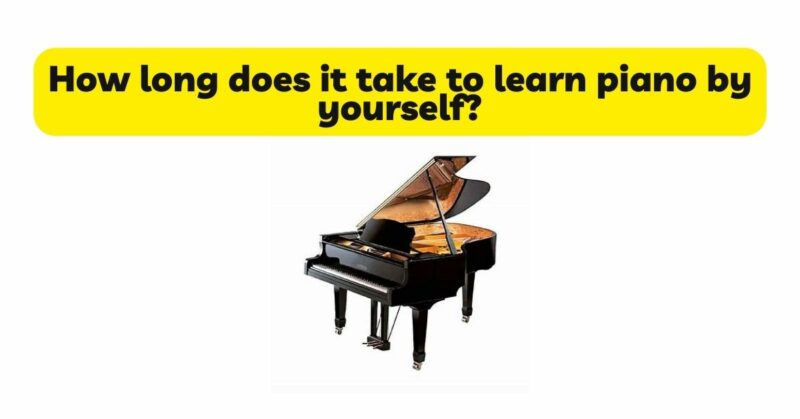Learning to play the piano is an exciting and rewarding journey that requires time, dedication, and consistent practice. When embarking on the path of self-learning, it is natural to wonder about the timeframe for acquiring proficiency and reaching musical milestones. However, the time it takes to learn piano by oneself can vary significantly based on several factors, including individual aptitude, practice consistency, prior musical experience, learning resources, and the level of mastery one wishes to achieve. This article aims to explore these factors and provide insights into the timeframe of self-learning piano. By understanding the variables that influence the learning process, individuals can set realistic expectations and embark on their piano journey with confidence.
Factors Influencing the Learning Timeline:
- Individual Aptitude and Musical Background:
The learning timeline can be influenced by an individual’s natural aptitude for music and their previous musical experiences. Those who possess a good sense of rhythm, pitch, and coordination may progress at a faster pace. Additionally, individuals with prior experience in music, such as playing another instrument or having a background in music theory, may find it easier to grasp concepts and develop skills related to piano playing. However, even individuals without prior musical experience can excel through diligent practice and a passion for learning.
- Practice Consistency and Quality:
Consistency and quality of practice are crucial factors that significantly impact the learning timeline. Regular and focused practice sessions allow for gradual skill development and retention of knowledge. It is generally recommended to practice the piano for at least 30 minutes to an hour each day. However, the duration and frequency of practice can vary depending on individual schedules and commitments. Consistency, coupled with effective practice techniques and a deliberate focus on improving weaknesses, accelerates the learning process.
- Learning Resources and Guidance:
The availability and utilization of appropriate learning resources play a vital role in the learning timeline. Self-learners have access to a plethora of resources, including instructional books, online tutorials, video lessons, educational apps, and sheet music. The quality and relevance of these resources, along with the ability to effectively utilize them, impact the speed of progress. Choosing reputable and comprehensive learning materials that cater to one’s skill level and goals can expedite the learning process.
- Musical Goals and Level of Mastery:
The timeframe for learning piano by oneself is influenced by individual musical goals and the level of mastery one aims to achieve. If the goal is to play simple melodies and accompany songs, progress can be made relatively quickly. On the other hand, aspiring concert pianists or those seeking advanced repertoire mastery require a more extended period of focused practice, refinement of technique, and deep musical understanding. It is important to set realistic and achievable goals based on personal aspirations and allocate sufficient time for dedicated practice.
Understanding the Learning Phases:
- Beginner Phase:
In the beginner phase, individuals familiarize themselves with basic piano technique, hand positions, fingerings, and music notation. This phase involves developing finger independence, learning to read sheet music, and playing simple melodies and chords. With consistent practice, beginners can expect to play simple tunes within a few months to a year, depending on their commitment and practice routine.
- Intermediate Phase:
In the intermediate phase, learners progress to more challenging repertoire, expand their technical skills, and delve deeper into music theory. This phase involves developing proficiency in scales, arpeggios, and chord progressions. Learners can expect to play intermediate-level pieces within a few years of consistent practice, though the timeframe can vary depending on the complexity of the repertoire and the individual’s dedication.
- Advanced Phase:
The advanced phase encompasses the pursuit of virtuosity and mastery. Individuals in this phase focus on refining their technique, honing their interpretive skills, and tackling complex and demanding repertoire. The duration of the advanced phase can vary significantly, ranging from several years to a lifetime, depending on the individual’s dedication, talent, and the level of mastery they aspire to achieve.
Strategies for Efficient Learning:
- Set Realistic Goals: Define your musical goals and set realistic expectations based on your available time, dedication, and aspirations. Breaking down long-term goals into smaller, achievable milestones allows for a sense of progress and motivation.
- Establish a Practice Routine: Develop a consistent practice routine that suits your schedule and commitments. Aim for regular, focused practice sessions, allocating specific time slots each day or week to ensure dedicated practice.
- Utilize Effective Practice Techniques: Adopt efficient practice techniques that maximize learning and skill development. Focus on specific technical exercises, sight-reading, ear training, and repertoire practice. Balance focused, deliberate practice with enjoyable playing to maintain motivation.
- Seek Feedback and Evaluation: Although self-learning, seek opportunities for feedback and evaluation. Record and listen to your playing critically, seeking input from fellow musicians, piano teachers, or online communities. Constructive feedback helps identify areas for improvement and accelerates progress.
- Embrace Diverse Learning Resources: Explore a variety of learning resources, including instructional books, online tutorials, video lessons, and educational apps. Find resources that resonate with your learning style and goals, and create a diverse learning environment that stimulates growth.
- Attend Workshops and Masterclasses: Attend workshops, masterclasses, and piano festivals conducted by experienced pianists and educators. These events provide exposure to different teaching styles, insights into performance techniques, and opportunities for feedback and evaluation.
Conclusion:
The timeframe for learning piano by oneself is highly individual and depends on various factors such as aptitude, practice consistency, learning resources, and musical goals. While some individuals may achieve proficiency in a shorter time span, others may take several years to reach their desired level of mastery. It is essential to approach self-learning piano with realistic expectations, patience, and a commitment to consistent practice. By understanding the factors that influence the learning process and employing effective learning strategies, individuals can embark on a fulfilling and rewarding piano journey at their own pace. Remember, the true joy lies in the journey itself, and every step forward brings new insights and musical growth.

